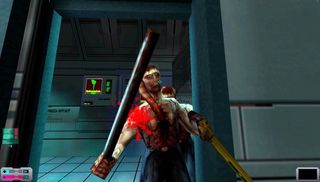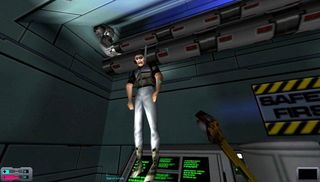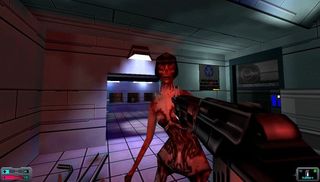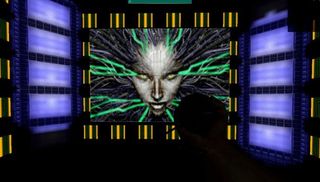Reinstall: System Shock 2

Reinstall invites you to join us in revisiting classics of PC gaming days gone by. This week, Cory takes a deep breath, braces himself, and journeys back into the hellish depths of the Von Braun in System Shock 2.
It's still out there. I can hear it through the door, wandering around the hallway. I lean around the corner quickly to look, catching the back of its head as it turns the corner. “Is... someone... there?” I hear it ask, dragging a shotgun along and searching for the intruder – me. I have no ammo, and I'm out of psi-hypos. My only chance is to bludgeon it with a wrench before its friends show up. Seizing my chance, I rush out, holding the mouse button down in order to prep my wrench swing. But it sees me, shoves its shotgun out and shouts, “Kill... me!”
System Shock 2 is about fear and scarcity above all else. Irrational Games' first game is where it developed the mechanics familiar to anyone who's played BioShock: build a world the player wants to explore, drop them in, and watch them uncover how that world fell apart. Nothing builds fear and tension like isolation, with limited resources and no one to help you. But while the studio's later games are shinier, its first outing is both more complex and, ultimately, more terrifying.

The sense of isolation is present from the beginning, where you generate your cybernetic soldier by choosing a base classsystem gun-toting Marine, hacking-heavy Navy officer or psionically-enhanced OSI agent – and then customise them through a predetermined set of 'missions'. Even though I had played SS2 years before, I couldn't remember how the bonuses would affect my character, and the game doesn't really explain the benefits. A tutorial shows me how the three classes will play, but there's no tutorial text for the customisation options. Luckily, you'll tailor your character further throughout the game by finding cybernetic modules and spending them at upgrade kiosks.
Each step you take has a weight to it, so movements like crouching or strafing feel more deliberate than in modern shooters. Attacking includes that same sense of weight. You won't swing your wrench like a master swordsman, but must pull it back to attack position before bringing it down on an enemy. Guns – once you're lucky enough to find one – also degrade with use, requiring constant repair and occasional modification. If this sounds complex, it is: you're not a superhero in SS2. In fact, you're just trying to survive.
Even your interactions with the world will leave you vulnerable. The game's inventory classsystem uses a drag-and-drop grid system overlaid across the playing window, and accessing it doesn't stop the monsters from hitting you. Security crates, cameras, turrets and vending machines can all be hacked through a 'match-three' minigame, which interrupts the action far less than BioShock's pipe-building puzzles. The desks on board the Von Braun starship are filled with items you can pick up; some, like credits and hypos, are immediately useful. Others, like orange juice or potted plants, may not be. It's an obsessive level of detail that makes the Von Braun feel lived in, and while rare back then, it's a detail found in many games since.

System Shock 2's backstory is told through audio logs discovered throughout the ship, a storytelling trope that has inspired lots of modern games. The vocal performances in these logs are as chilling now as they were in 1999 – listening to the horror descend on the crew intensifies the terror of your own predicament. The logs also show off the game's impressive audio design, particularly in the menacing sounds of hybrids and cybernetic midwives. Thanks to SS2, I'm convinced to this day that all monkeys hide psionic powers and plan to overthrow us.
PC Gamer Newsletter
Sign up to get the best content of the week, and great gaming deals, as picked by the editors.
Because SS2 provides so few resources, I found myself hoarding ammo, health and psionic hypos though most of the game, and relying on melee attacks with the wrench. Security cameras quickly alerted monsters to my presence – and those alerts last for (what feels like) forever. That tension directly contrasts with BioShock: instead of shooting my way past enemies, I had to wait them out, or outsmart them. I crouched behind boxes or desks for much of the game, waiting for a hybrid to pass or a camera to turn before rushing in for the kill or hack.

That tension carries over to your character's upgrade options, where every new power or skill meant I was missing out on other possibilities. Ignoring hacking or psionics means there are crates I won't get to open, or powers that won't be available to me. Every choice I made for my soldier's upgrades mattered, and so I took them seriously. BioShock's plasmids, in comparison, are far more accessible. I was never going to miss out on using Incinerate.
My favourite part of revisiting SS2, however, was the relationship that develops between me and SHODAN, the malevolent AI at the centre of the story. Without spoiling anything, the twist here feels more personal to me than in BioShock. The suspense of wondering just when SHODAN would decide to screw with me was delightful, as is her complete contempt for the player.
Almost 15 years on from its release, and with two separate spiritual successors, System Shock 2 still feels fresh. The newest release through GOG.com and Steam allows for higher resolutions, as well as support for the mods created by the game's community. The interaction is far more complex than BioShock's run-and-gun approach, and certainly more terrifying. BioShock's story may be deeper and more refined, but the RPG elements of System Shock 2 still feel ahead of their time today.
You can pick up System Shock 2 from GOG.com for $10.
Most Popular

